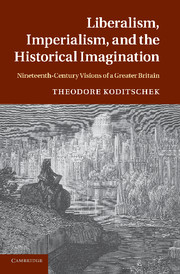 Liberalism, Imperialism, and the Historical Imagination
Liberalism, Imperialism, and the Historical Imagination Book contents
- Frontmatter
- Contents
- Acknowledgements
- List of abbreviations
- Introduction
- 1 Imagining Great Britain: Union, Empire, and the burden of history, 1800–1830
- 2 Imagining a British India: history and the reconstruction of Empire
- 3 Imagining a Greater Britain: the Macaulays and the liberal romance of Empire
- 4 Re-imagining a Greater Britain: J. A. Froude: counter-romance and controversy
- 5 Greater Britain and the “lesser breeds”: liberalism, race, and evolutionary history
- 6 Indian liberals and Greater Britain: the search for union through history
- Epilogue: From liberal imperialism to Conservative Unionism: losing the thread of progress in history
- Index
- References
4 - Re-imagining a Greater Britain: J. A. Froude: counter-romance and controversy
Published online by Cambridge University Press: 04 April 2011
- Frontmatter
- Contents
- Acknowledgements
- List of abbreviations
- Introduction
- 1 Imagining Great Britain: Union, Empire, and the burden of history, 1800–1830
- 2 Imagining a British India: history and the reconstruction of Empire
- 3 Imagining a Greater Britain: the Macaulays and the liberal romance of Empire
- 4 Re-imagining a Greater Britain: J. A. Froude: counter-romance and controversy
- 5 Greater Britain and the “lesser breeds”: liberalism, race, and evolutionary history
- 6 Indian liberals and Greater Britain: the search for union through history
- Epilogue: From liberal imperialism to Conservative Unionism: losing the thread of progress in history
- Index
- References
Summary
He [Macaulay] was the creation and representative of his age … launched into life when the fever of revolution was recommencing. Once more the enthusiastic and hopeful part of the world was beginning to believe that an extension of political power to the masses of the people was a panacea for all the woes which afflicted society … The commercial organization was in its most wholesome condition when every individual was pursuing his own interests in an enlightened manner. The same principle was extended to every province of human activity. The interest of the community was said to be identical with the interest of the individual … A better state of society might be anticipated from the unshackled efforts of every single person to improve his own condition than had ever been arrived at under the paternal authority of the best kings or aristocracies.
J. A. Froude, “Lord Macaulay,” Fraser's Magazine, NS, 13 (June, 1876), 675–94, quotes at 679, 681When James Anthony Froude published this retrospective on Macaulay, he wrote in confidence that the spirit of the age had changed. Society no longer automatically acceded to individual self-interest when its collective survival was deemed to be at stake. The cants of liberty and progress were no longer allowed to pass without question. “What kind of liberty,” people now asked, “liberty to the good, or liberty to the fool and knave? The liberty of anarchy, or the liberty of wisdom and self-restraint?”
- Type
- Chapter
- Information
- Liberalism, Imperialism, and the Historical ImaginationNineteenth-Century Visions of a Greater Britain, pp. 151 - 205Publisher: Cambridge University PressPrint publication year: 2011


